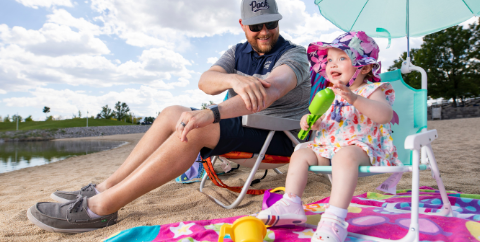Skin cancer continues to be most common cancer in Nevada, U.S.
05 May, 2023
More people are diagnosed with skin cancer each year in Nevada than all other cancers combined, according to the American Cancer Society. This year it’s estimated 800 Nevadans will be diagnosed with melanoma, the deadliest form of skin cancer, and thousands more will be told they have basal cell or squamous cell carcinomas.
May is Skin Cancer Awareness Month and an opportunity for sun safety advocates and dermatologists to remind the community to take care of their skin.
“People often don’t take skin cancer seriously, but it can be deadly and it affects people of all skin colors,” Lily Helzer, a program manager with Nevada Cancer Coalition, said. “Skin cancer, regardless of the form, can have devastating impacts on a person, from scarring and disfigurement to, sadly, death. Fortunately, it can often be prevented by taking a bit of extra caution.”
Helzer manages Nevada Cancer Coalition’s Sun Smart Nevada and Sun Smart Schools programs, an effort to provide sun safety information and prevention tips to Nevadans to reduce the risk of future skin cancers. In addition to education in schools and at community events, the program advocates for sunscreen dispensers in community locations to increase sun protective behaviors.
Since the program began in 2015 more than 100 dispensers have been placed in schools, parks, pools and other locations throughout the state. Partners such as Comprehensive Cancer Centers of Nevada (CCCN) and Skin Cancer and Dermatology Institute (SCDI) have joined the movement and taken it to the next level. CCCN, a southern Nevada cancer treatment practice, has placed dozens of sunscreen dispensers throughout the Las Vegas valley. SCDI sponsors sunscreen dispensers in northern Nevada and is supporting shade tree installation at area schools.
In addition to wearing a broad spectrum, SPF 30 or greater sunscreen, several additional steps can be taken to reduce the risk of skin cancer. Those include:
- Wearing sun protective clothing such as long sleeves and pants. Many sportswear companies offer SPF protection built into the fabric and made to protect skin from the sun while keeping the wearer cool.
- Adding sun-smart accessories like a wide-brimmed hat to protect the scalp, ears, nose, neck and shoulders, and wearing UV-protective sunglasses. Many people don’t realize they can get melanoma in their eye!
- Seeking shade during peak sun hours, generally from 10 a.m. to 4 p.m. This could be just staying indoors during this time, but it could also be doing things such as using a shade umbrella or sitting under a shade tree or awning.
- Avoiding tanning beds. Tanning beds are NOT safer than the sun and in fact are much more dangerous. Indoor tanning emits UV radiation in amounts 10-15 times higher than the sun at peak intensity. The Skin Cancer Foundation notes that more people develop skin cancer because of indoor tanning than develop lung cancer because of smoking. (Whoa!)
In addition to working to prevent skin cancer, Nevadans can perform regular skin checks on themselves by looking at all areas of their skin (a mirror and a partner are always helpful with this) to look for any changes in their skin such as moles or lesions that have changed color, increased in size or become itchy or oozing. The basics to watch for are moles or spots that follow the ABCDEFs:
- Asymmetry – moles that are an irregular shape.
- Border – moles that have a ragged rather than smooth border.
- Color – moles that have several colors or have changed color.
- Diameter – moles that are larger than the size of a pencil eraser.
- Evolving – moles that have changed over time in any of the above-mentioned ways.
- Feeling – moles that itch or burn.
Dermatologists are also trained to check skin for cancer and often have tools that can identify potential skin cancers that the naked eye would not spot. For those who have the ability to visit a dermatologist, an annual skin check is a great idea. For more information on sun safety, skin cancer prevention and early detection, and Sun Smart Nevada, visit SunSmartNevada.org.
You May Also Like

What the FDA’s bemotrizinol proposal means for Nevada
12.23.2025
Nevada’s sun-soaked skies are part of what makes our state beautiful — and what makes sun protection essential.

What the FDA’s bemotrizinol proposal means for Nevada
12.23.2025
Nevada’s sun-soaked skies are part of what makes our state beautiful — and what makes sun protection essential.

What the FDA’s bemotrizinol proposal means for Nevada
12.23.2025
Nevada’s sun-soaked skies are part of what makes our state beautiful — and what makes sun protection essential.